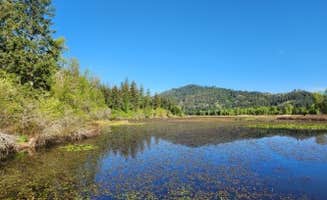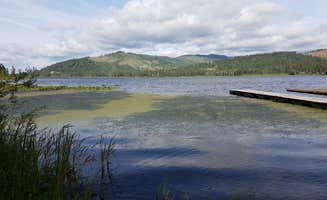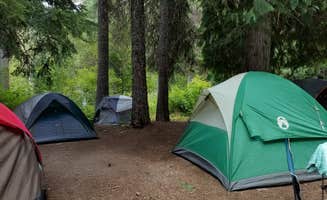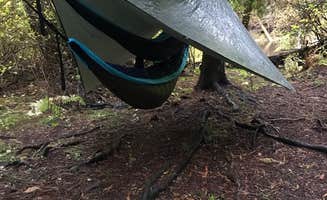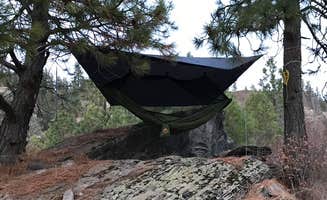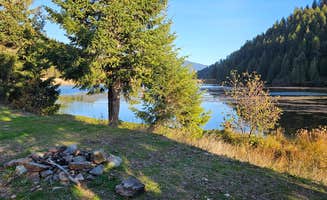Primitive camping near Medimont, Idaho offers multiple sites along lakes, rivers, and forested areas. Most dispersed camping sites sit between 2,100-2,500 feet elevation, experiencing hot summer days that can reach 90°F while nights cool considerably. The camping season typically runs from late April through October, with many areas becoming inaccessible due to snow and mud during winter months.
What to do
Fishing opportunities: North Fork Coeur D'Alene River camping provides excellent fly fishing access. According to one visitor at North Fork Coeur D'Alene River: "The fish were jumping like CRAZY the night I stayed!" The river's clear waters support populations of cutthroat trout, making it popular during summer months.
Riverside relaxation: Many dispersed sites offer direct water access for swimming and wading. At Rose Lake, "You can walk down to the lake and sit on the dock to watch the sunset," notes one camper. The lake features a boat dock and launch area for fishing or paddling.
Mountain hiking: Forest roads near Lakes Divide Road provide access to several unmarked trails. One camper described the area as having "a beautiful ride up the mountain" with potential for day hikes. Most trails are unmarked and moderate to difficult, requiring proper footwear and navigation skills.
What campers like
Secluded spots: While main areas fill quickly, more remote locations stay quieter. A camper at Hanks Meadow noted: "Beautiful! Quiet River sign meadow. Approximately room for four camper setups. Couple of fire rings. Beautiful mountain side. Have to ford Creek to access. Just one party there on memorial weekend."
Riverside camping: Many campers appreciate the direct water access. A visitor to Big Creek, Calder shared: "There are secluded dispersed campsites on Big Creek between the campgrounds on Big Creek RD. If you're set up for off grid its definitely worth spending a few days fly fishing or hiking the area. Very serene!"
Wildlife viewing: The forest areas host deer, elk, and numerous bird species. "We tent camped last year and RV camped this time. Very nice!" reported a camper at Donkey Creek Campground, where wildlife sightings are common in the early mornings and evenings.
What you should know
Road conditions vary greatly: Access roads range from maintained gravel to challenging forest routes. One camper at Bull Run Access Dispersed provides specific directions: "Cross the one-lane bridge > make a right till you hit the parking lot > make another right towards the sign that says 'sportsman access' > stay straight until you are prompted to make a left."
Fire restrictions change seasonally: Fire rings exist at some sites, but restrictions often apply during dry months. Many primitive sites have user-created fire rings, but carrying a portable stove is recommended during high fire danger periods.
Limited facilities: Most areas have no drinking water or bathrooms. At Rose Lake, there's "a vault toilet with its own parking space" but most other sites require campers to pack in water and manage waste properly.
Tips for camping with families
Choose sites with easy water access: Shallow riverbanks provide natural play areas. A family camper at Bull Run Access Dispersed shared: "Went with the family in mid May on a perfect weekend weather-wise. If you drive past the first couple grass campsites and continue on the narrow road with water on both sides, just off to the right is a single secluded campsite amongst the tree. The best site there imo."
Consider noise levels: Some areas experience increased noise from hunters and recreational vehicles. One family noted about Bull Run: "We listened to gun shots most of the day… not exactly the peaceful nature vibe we were hoping for. Would likely come back, but pray it's a day of no hunters."
Plan for insects: Mosquitoes are prevalent near water, especially at dusk. As one camper at Bull Run warned: "Close to the water so of course, there were some bugs: lots of bees and mosquitoes." Bring repellent and consider mosquito netting for tent doors.
Tips from RVers
Check site levelness: Many dispersed areas have uneven ground. A Rose Lake visitor cautioned: "I struggled with this place, it would be really great if the two lot areas were level. There isn't a level spot anywhere." Bringing leveling blocks is essential for most sites.
Research specific sites for larger rigs: Some areas can accommodate sizeable trailers. At Big Creek, dispersed sites between official campgrounds can fit smaller RVs, while Bull Run Access has been tested by larger rigs: "We were able to get our fifth wheel (40ft long, 13 1/2 ft tall) in and out easy! Lots of spaces and places to turn around."
Supply preparation: With no hookups or facilities, RVers must be self-sufficient. Bring ample drinking water, empty waste tanks before arrival, and pack out all trash. Most sites have no designated dump stations within 20 miles.


